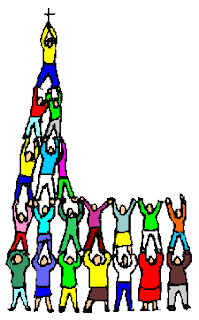Free to ... TWEET !?!
 |
Shared ideas, shared thinking,
... shared vision!
Jump in? |
A few days ago, a student in India posted a mildly critical comment about a public figure who had died. Within hours, he was arrested along with a friend who had 'liked' the comment. Keep in mind, India is one of the stronger democracies.
In China, a mother was sentenced to 'reeducation through labor' for protesting her daughter's mistreatment by local police. The social media uproar by millions brought worldwide attention and her release. And vindication in the public and national forum.
The 2500 year old battle for free speech continues. Today, more than NATO or the UN, tyrants now fear the social media. :)
Exercise and enjoy the freedom you have to speak, to tweet, to blog what's on your mind! What an extraordinary benefit; what a powerful lever in a changing world!
Digital Weaponry, part 2
Bloggers now out-produce all the world's publishing houses combined. |
| Commuters use mobile devices. Can China’s Social Media Break the Chains of Censorship? |
 In China, it's Weibo.com, among others. Today it’s the top platform for social discourse and a big driver for
consumer activity. It’s also a celebrity hub. Just as American
celebrities communicate with their fans via Twitter, Chinese celebrities
depend on Weibo as a way to connect with their fans and drive
popularity. Interestingly enough, Bill Gates easily has twice as many
followers as Tom Cruise on Twitter (Gates with 7,215,994 and Cruise with
3,077,444), but Cruise has 4,231,919 followers on Weibo, one million
more than Gates.
In China, it's Weibo.com, among others. Today it’s the top platform for social discourse and a big driver for
consumer activity. It’s also a celebrity hub. Just as American
celebrities communicate with their fans via Twitter, Chinese celebrities
depend on Weibo as a way to connect with their fans and drive
popularity. Interestingly enough, Bill Gates easily has twice as many
followers as Tom Cruise on Twitter (Gates with 7,215,994 and Cruise with
3,077,444), but Cruise has 4,231,919 followers on Weibo, one million
more than Gates. |
China's Weibo.com, the social media of current note, has badly
shaken the status quo of corrupt community governments ...
|
So thanks to bloggers (and tweeters), welcome to Egypt and the Arab Spring, welcome to murderous Syria, to Wall Street's back rooms, to Mombasa from inside the government circles, to Nigerian oil-sodden wastelands, to China's corrupt local governments, to the mass media as seen through the eyes of someone whose vision is larger.
 |
| Slammed by the overwhelming will of the people expressed worldwide and instantly! |























